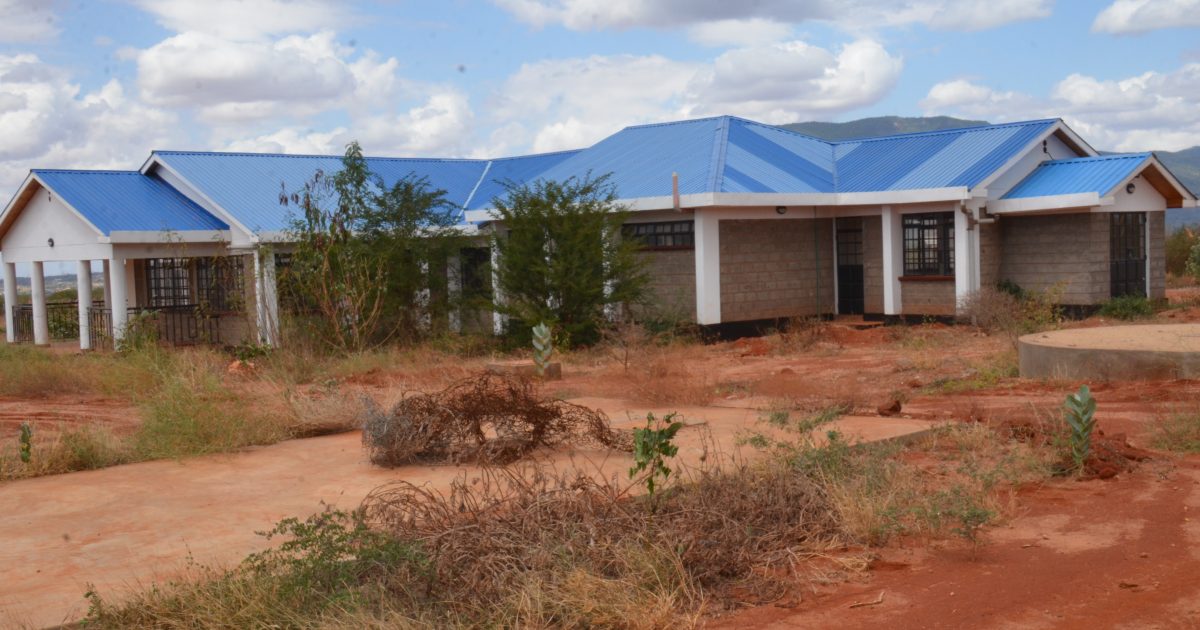Few experiences match the exhilaration of riding the Standard Gauge Railway (SGR) train cruising at dizzying speeds across the breathtaking Tsavo landscape.
However, to hundreds of learners at Voi Girls Education Center, the distant sound of approaching SGR trains triggers unpleasant feelings. Whenever the train hurtles past the low-cost girls’ school, lessons are briefly interrupted. It is impossible to hear a word above the din. Students wince. Others cover their ears to block the noise.
“The noise still bothers us,” discloses a Voi girls’ teacher who prefers to remain anonymous for fear of reprisals from education officials.
Tucked at Tanzania village in the outskirts of Voi town, Voi Girls Educational Center lies within shouting distance from the SGR tracks. With passengers and cargo trains rambling by the institution daily, tidal waves of noise that swamp the facility can understandably make learning a challenge.
As learners struggle with the daily noise, an alternate Sh230-million ultra-modern school set up to save them from the noise remains unoccupied two years after its completion. The new institution is wasting away as bushes and wild weeds threaten to overrun the buildings in a school that is yet to be commissioned.
Questions abound on why learners at the old Voi Girls School were yet to relocate to the new institution. County Commissioner Loyford Kibaara says Kenya Railways, the client, is expected to clear a pending bill owed to the contractor over the project.
“There is an outstanding issue on payment owed to the contractor. Once that one is cleared, things can move on,” said the administrator.
Dubbed as New Voi Girls School, the grand institution will accommodate over 400 learners. Located approximately 10-km from the SGR tracks, the new site is deemed as perfect in providing learners with a conducive environment.
Still, the long wait has become a source of concern for parents who are now expressing dismay over the delay in relocating their daughters. They term it as a major drawback that is likely to affect the school performance.
Chair of Parents Association for Voi Girls Education Center Mr. Juma Kombora says SGR noise and disruption interferes with learning activities. “The new school is lying idle yet learners continue to suffer from noise,” he says.
It is delay and disruption more than anything else that has been cited as the major challenge since the start of the project in 2019. The new school was a product of a negotiated agreement by officials of KR, education officials, stakeholders and political leaders of Taita-Taveta in 2016 who wanted learners at the old school to get a new institution away from SGR noise.
The construction was set to start on 7th of February. However, it was delayed and kicked off in 14th February 2019.
The Managing Director of Jedy General Contractors Limited Mr. Eliud Wachira says delay and unforeseen disruptions adversely affected the pace of the project. Instead of taking 12 months as envisaged, the project ended up taking 36 months.
“Delays have been the biggest obstacles in this entire project. From the time the handing over was to be done, there has been a long series of delays that come with additional costs,” he says.
Based on the designs by Kenya Railways, the institution is technically complete. It has eight classrooms; four modern labs-Computer, Biology, Chemistry and Physics; a library; four-units of staff houses; administration block; one-storey dormitory, kitchen and a dining hall. Other facilities include a football field; construction of drainage system and septic tanks and a fence of the 12-acre land the school sits on.
Despite the magnificence of the buildings, experts say the institution cannot be occupied by learners due to lack of critical amenities like water and electricity. The initial plans also lacked designs for a proper waste-disposal system.
The contractor says the school is inhabitable and will require installation of a water system and electricity before it is considered ready.
“The construction works are complete but there are areas that need more work before commissioning. The institution has no water and the toilets are water operated. For a girls’ school, that is very critical,” he says.
Plans are underway to tap water from the main Mzima line that supplies Mombasa. Drilling of borehole was deemed a risky venture due to the cost and uncertainty on whether the water was safe for consumption. The government through the Rural Electrification Authority has embarked on power distribution at the institution.
Currently, the new school remains eerily deserted. A lone gateman sits by the gate to keep vandals at bay. The emptiness and the silence is spooky. A sense of abandonment and looming dilapidation lingers heavily in the air. The entire compound is unkempt. Thorny bushes, layers of double-thorns, dry undergrowth and weeds are rapidly spreading across the buildings in the school. The contractor has employed a few workers who tour the school occasionally to check on the status of the buildings.
Wachira says delays and failure to meet the deadlines increased the overall operational costs.
The most severe disruption was the stoppage of works by the National Environment Management Authority (NEMA) for a month for lack of Environmental Impact Assessment (EIA) report. This was followed by work disruption from the National Construction Authority (NCA).
“The stoppage hit us hard. The client was to get all approvals and requisite licenses. NEMA and NCA stopped everything at a time we had mobilized massively equipment and manpower,” says the contractor.
There was also a flaw in design for the dormitory to suit the terrain. The client sent the new designs after six months.
The delays made the contract period to be extended twice. The project consultant eventually abandoned the site in frustration over regular non-payment. Since the construction works ended in June 2021, the institution has remained unoccupied.
The final inspection was carried out in January 2022. Kenya Railway is expected to make the final payment to the contractor to allow for handing over.
The school was slated to be taken over by Kenya Railway by end of February but the contractor is yet to be paid.
“We are waiting for our payment. The initial cost went up because the project took three years instead of one year. Time related costs like insurance, hiring of guards and cost of material came as a result of the delays,” says the contractor.
By Wagema Mwangi




